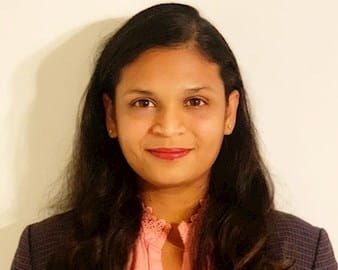Why were you interested in this class?
Shubham: Coming from an engineering background, I often relied on my analytical skills and objective mindset to respond to or assess any situation, personal and professional. While professionally it worked for some time as I climbed the lower rungs of the ladder, I soon realized that to progress further in my career, I needed to develop my emotional faculties and understand the interpersonal dynamics at play, be it at work or home. While conceptual or domain knowledge is useful, people accept your expertise only when they trust you and feel safe in collaborating with you. I spent most of my adult life in the US as an immigrant and with all genuine candor, I felt anxious and fearful of living far away from my home. I think that blocked my learning, and I needed a platform to share my true feelings, overcome these anxieties, and understand myself at a deeper level. I thought this course would be an ideal place to share and experiment with my feelings, and to grow emotionally. My interest was further reinforced when one of my friends who took the class earlier shared his rave reviews.
Anaya: I heard amazing things about this class through a student who had taken it previously as well as through Booth’s Slack channel. I decided to check it out and read the syllabus. I also read several articles on why Interpersonal Dynamics, known as “touchy feely” at Stanford Business School, was the most important course offered there. I was in my second quarter at Chicago Booth and I wanted to take courses that challenge me and take me out of my comfort zone. I also wanted to learn to build effective relationships by effective communication, which is something the course promised to do.
Melissa: Interpersonal skills are ones that generally go unspoken and untaught, despite their importance in our professional and personal lives. When this course was brought to Chicago Booth, I knew I wanted to be a part of the experience in order to become a better version of myself and a more authentic leader.
Tell us about the class in a few sentences.
Shubham: I think the class is like no other at Chicago Booth in terms of its long-term impact on life. The objective of the class is to help students understand their emotions 'as is' and use such emotions to build interpersonal dynamics and understand oneself. The class is made up of a short lecture portion and Training group (T-group). The time allocated to the T-group keeps increasing as the course progresses and there is often a data-generating exercise just prior to meeting with the T-group.
Anaya: The class is about exploring feelings and relationships in an unstructured Training Group. Classes start with learning concepts and then students discuss amongst each other thoughts and feelings that come up by observing others. There wasn't a facilitator for the T-group but sometimes our professor helped make sense of certain reactions or feelings. The class also taught valuable lessons around giving and receiving feedback through specific exercises in the first part of the class and then discussing reactions and feelings that came up during the exercises in the second part of the class.
Melissa: The course consists of a group of about 10 students who all show up under an implicit agreement to be vulnerable and bring our full selves to class each week. Time in class is split between lecture, interactive activities, and T-group, which is an unstructured environment to practice the skills we have learned. There is also a weekend retreat where we deep dive into T-group and get to know ourselves and each other better than we could have ever imagined.
What did you learn in class and what was a highlight for you?
Shubham: The experience was transformative for me. I learned about myself. The class helped me peel back layers of my personality and at the end, I enhanced my self-awareness and self-expression. The class taught me how to test my assumptions and mental models. I learned the importance of feedback and how it can really help you improve. It helped me to understand my emotions and its origin at a much deeper level. I learned how to forge connections and build relationships as well as learned more about group dynamics — influence and power.
Anaya: The class started with setting specific learning goals for myself, and my goals kept evolving as the class progressed. It taught me amazing step-by-step techniques to give effective feedback and express feelings using specific words. Reducing the voices in my head (reducing self-talk) by asking meaningful questions (checking assumptions) was the highlight of the class and my biggest takeaway.
Melissa: Although it can be risky, I learned how worthwhile it is to share my emotions. In the business setting, this is often considered too “touchy-feely,” and most are uncomfortable with going there. However, that leaves much unsaid and unresolved, and blocks us from forming deeper relationships and higher functioning teams. As I graduate from Chicago Booth this spring and transition into the next phase of my career, these are lessons I will take with me.




